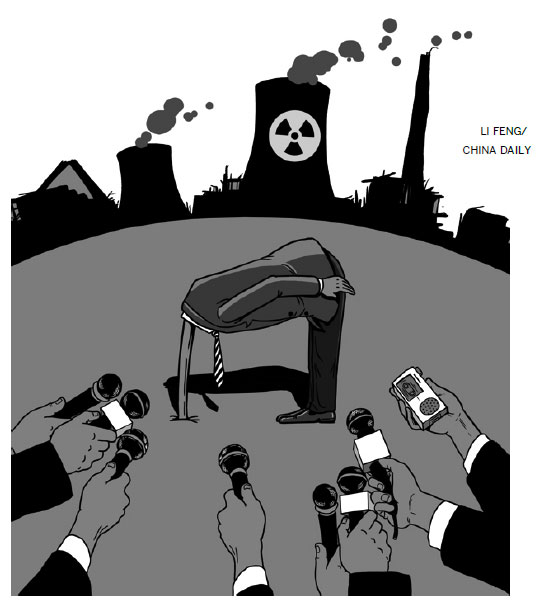The puzzle that is Fukushima nuclear plant
Updated: 2016-06-18 07:43
By Cai Hong(China Daily)
|
||||||||
A report issued by a third-party investigation commission on Thursday suggests a massive cover-up of the Fukushima nuclear power plant nuclear leak by Tokyo Electric Power Co.
The report says that under the pressure of the office of then Japanese prime minister Naoto Kan, Masataka Shimizu, then president of the Fukushima plant's operator Tepco, ordered his executives to not use the term "meltdown" to describe the condition of the fuel rods in the reactors in the days immediately after a massive earthquake and tsunami severely damaged the Fukushima Daiichi nuclear power plant on March 11, 2011. Tepco referred to the "meltdown" as "core damage" (a less serious classification) till May 2011.
Widespread radiation leaks forced the evacuation of tens of thousands of people from areas near the plant, and it will take decades to clean up the plant and rid the areas of radiation.
Over the past five years, whenever Tepco was asked why it didn't use the term "meltdown" for two months, it made one excuse or the other. As late as November 2015, it said it "had not defined" what constituted a "meltdown".
But Tepco is believed to have written a disaster management manual in 2003 that defines a meltdown as damage exceeding 5 percent to a reactor's fuel rods. The company knew the damage to the three reactors' core was between 25 and 55 percent as of March 14, 2011, but it still feigned ignorance.

In February this year, it said that it took two months to announce the "meltdown" because its officials were unaware of the criteria. It also claimed the discovery of its own manual that month.
Finally, Tepco's chief nuclear officer Takafumi Anegawa admitted at a press conference on May 30 that the company had concealed the news of the meltdown. Tepco ascribed the two-month delay to the "fact" that only five or so people working at its headquarters in Tokyo knew the internal criteria for a meltdown when the tsunami struck the Fukushima nuclear plant.
Now, Tepco is eager to bring online two of the seven reactors at the Kashiwazaki-Kariwa nuclear power plant, the world's largest, in Niigata prefecture, for which it has approached the local nuclear technology committee. Moreover, on March 23, Tepco apologized for giving misleading responses to the committee's repeated inquiries about the meltdown at Fukushima.
But Niigata governor Hirohiko Izumida is wary of restarting the Fuku-shima nuclear plant and has said the full picture of the Fukushima disaster is yet to emerge. In January he turned down Tepco president Naomi Hirose's offer of collaborating in drawing up an evacuation plan for a possible emergency at the Kashiwazaki-Kariwa plant.
"Trust in Tepco has been eroding. We cannot move ahead unless we are convinced of the veracity of what the company says," Ken Nakajima, chief of Naiigata's nuclear technology committee and professor of reactor safety at Kyoto University, said in an interview with Asahi Shimbun.
Also, three former Tepco executives were indicted in late February for allegedly failing to take all the required safety measures, including those against tsunamis and quakes, at the Fukushima nuclear power plant despite being aware of the risks. The company's 2008 internal report predicted that a tsunami with waves as high as 15.7 meters could hit the plant.
As Tepco's self-contradictory justifications dent its credibility, the Fukushima disaster remains a puzzle.
The author is China Daily Tokyo bureau chief. caihong@chinadaily.com.cn

(China Daily 06/18/2016 page5)
- Planned Obama, Dalai Lama meeting protested
- Gravitational waves detected for second time: scientists
- 48-hour 'silence regime' starts in Syria's Aleppo
- UN Security Council adopts resolution on Libya arms embargo
- US extradites top drug lord 'El Guero Palma' to Mexico
- Houston firm joins China clean energy project

 Photographer wants people to care for endangered animals
Photographer wants people to care for endangered animals
 Iconic pagodas turn into a dreamland in infrared photos
Iconic pagodas turn into a dreamland in infrared photos
 Mass yoga events ahead of International Yoga Day
Mass yoga events ahead of International Yoga Day
 Thangka worship activity held in Lhasa
Thangka worship activity held in Lhasa
 Top 10 most valuable car brands in the world
Top 10 most valuable car brands in the world
 Floods cause havoc across south, central China
Floods cause havoc across south, central China
 Top 10 Chinese cities with highest housing rent
Top 10 Chinese cities with highest housing rent
 Polish art rediscovers its roots
Polish art rediscovers its roots
Most Viewed
Editor's Picks

|

|

|

|

|

|
Today's Top News
Abe's blame game reveals his policies failing to get results
Ending wildlife trafficking must be policy priority in Asia
Effects of supply-side reform take time to be seen
Chinese State Councilor Yang Jiechi to meet Kerry
Chinese stocks surge on back of MSCI rumors
Liang avoids jail in shooting death
China's finance minister addresses ratings downgrade
Duke alumni visit Chinese Embassy
US Weekly

|

|









